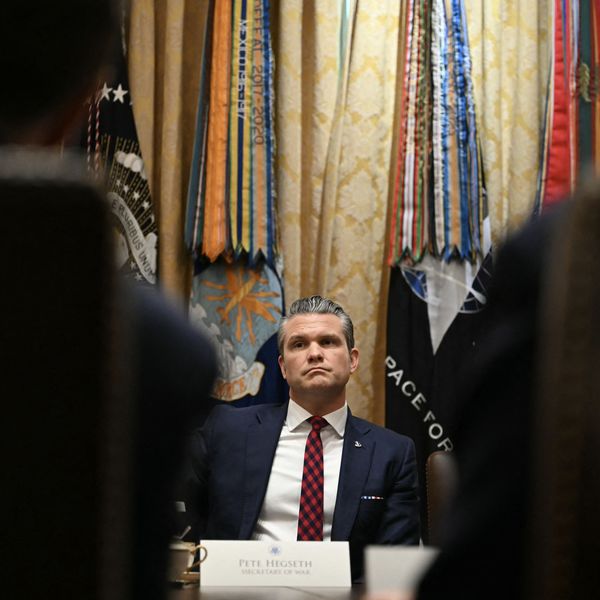In Berkeley, it's difficult to travel more than a few blocks without seeing an "Impeach Bush" bumper sticker. And whenever I write a column about the 43rd President, I receive emails suggesting that the simplest solution to America's problems is his impeachment. Nonetheless, I'd never taken the possibility of impeachment seriously until this week, when I realized I've had enough: I want Dubya to go down.
The movement to impeach George W. Bush started around Labor Day, in 2002, when it become clear that he was determined to invade Iraq. In March 2003, it gathered momentum when many Americans joined marches and silent vigils to protest what we considered to be an ill-considered and dangerous action. Bush was enormously popular and many "blue" Americans felt we had lost our country: we couldn't understand why so many of our fellow citizens supported Dubya; or why they voted to reelect him in 2004. In those dark days, the impeachment movement seemed to be the last refuge of die-hard liberals: a defiant stance that had little hope of success.
Times changed: in 2006, Democrats took control of Congress and Bush's popularity rating sank to Nixonian depths. Meanwhile, evidence of his malfeasance exploded. Suddenly, even conservative Republicans were criticizing the President, calling for him to abandon his customary intractability and engage in real bipartisanship.
As the impeachment movement grew stronger, I resisted its call for several reasons. While I've never doubted that there are strong legal grounds for Bush's impeachment, I've been troubled by pragmatic considerations: if Dubya was removed from office, Dick Cheney would become President; impeachment proceedings would tie up the 110th Congress at a time when congressional energy needs to be focused on undoing Bush Administration mistakes -- such as ending the war in Iraq; and the impeachment process would further polarize a nation that has become far too adversarial and combative. When the Speaker of the House, Nancy Pelosi, said that impeachment was "off the table," I agreed: it's one thing to be right and quite another thing to be effective, I thought.
My thinking changed after I read George Packer's magnificent commentary in the May 14th New Yorker Magazine No Blame, No Shame. Packer asks the key question: "Why has it become impossible to admit a mistake in Washington and accept the consequences?" I pondered the fact that "under the Bush Administration no senior civilian official or military officer has been held responsible for what will probably turn out to be the greatest foreign policy disaster in American history." Then, I had an epiphany: I understood the "why" Packer asks about. The reason why Bush never admits a mistake or accepts consequences is because he believes he can get away with it. He was raised in a system of privilege where there's no accountability.
George Bush's unwillingness to be held personally responsible reflects on more than his Administration. It's a symptom of a deeper malaise that infects American politics and, sadly, much of American society. It's what I think of as the dual justice system. I first ran into this system many years ago when I was an idealistic probation officer in Orange County: courthouse habituAf(c)s informed me that the defendants whose cases I handled were exclusively from the lower and middle class, because there was a different system of justice for the rich and powerful - patricians didn't go through the same process that plebeians did. Whether their crime was petty theft or murder, the elite received different treatment than they would have if they had been poor, or a person of color.
There are two systems of justice in the United States: one for the rich and powerful and a far different system for everyone else. Rob a bank and you go to prison; loot a savings and loan as an executive and you're likely to get a hefty fine, if that. Every day, we read about corporate executives who mismanaged their firms, caused the layoffs of thousands of poorly paid workers, and then danced away with millions of dollars of severance pay. We see what happened to the architects of the disaster in Iraq: Bremer, Franks, and Tenet got the "Presidential Medal of Freedom," Rice and Wolfowitz got promoted, as did the invasion supporters within the Pentagon. There was no accountability; they got away with it. So far.
That's why the impeachment of George W. Bush would send an important signal to other elected officials, and the power elite. It would be an indication that the American people are tired of Washington business-as-usual and serious about holding our leaders accountable for their actions. I'm not suggesting that the focus be exclusively on Bush, because I think his whole crew - Cheney, Gonzales, Rice, and Rumsfeld, among others - should go down, too. However, the logical place to start is with the guy at the top: the decider-in-chief.
Bob Dylan once wrote" "even the President of the United States sometimes has to stand naked." This is the time for the trappings of power to be stripped from George Bush. He needs to stand naked before the law and take full responsibility for the failures of his Administration. Impeach Dubya.
Bob Burnett is a Berkeley writer. He can be reached at bobburnett@comcast.net


